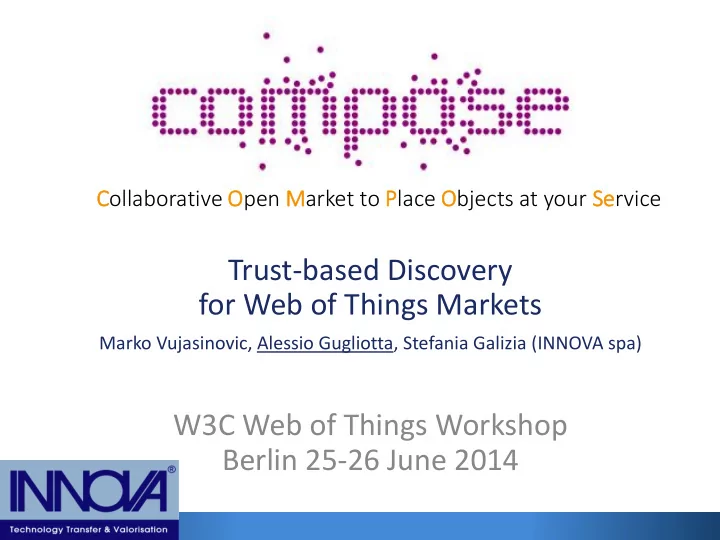

Collaborative Open Market to Place Objects at your Se Service Trust-based Discovery for Web of Things Markets Marko Vujasinovic, Alessio Gugliotta, Stefania Galizia (INNOVA spa) W3C Web of Things Workshop Berlin 25-26 June 2014
COMPOSE Marketplace (h (http:// //www.compose-project.eu/) 6/25/2014 2
Trust Vision/Position • The concepts of trust and trust negotiation will play a central role in the discovery of objects and services in the Web of Things marketplaces • users will be searching products that are trustworthy to them in user-specific application contexts • users have specific trust policies (trust expectations) and look for products with trust guarantees that satisfy the trust expectations • So, yet, another definition of trust? NO • Our main statement is the trust is a subjective, multifaceted, and context-dependent concept • We need a mean to generally capture (and annotate) the multiple trust perceptions and use them to drive things discovery (as a value) 6/25/2014 3
Trust in WoT oT Marketplaces • Trust : as an evaluated expectation a user of a object has about the object behavior, before using it in a specific context. • Trust Negotiation : a process of evaluating whether two participants, e.g. a service user and service provider, can engage into a trustworthy relationship, according to their respective trust policies and trust guarantees. 6/25/2014 4
Trust in WoT Marketplaces • Existing eCommerce Marketplaces (Amazon, eBay) mainly adopt use, reputation-based trust mechanisms (scoring, rating) • In WoT Marketplaces: • the reputation-based trust will be beneficial, however, might not be not sufficient per se • the trust relationship is bidirectional, in most cases • trust expectations could envelop additional indicators such as security and privacy guarantees, QoS, or quality of the data. • trust indicators and their level of details may be different to different users, may change in different contexts, or may be different in the same context for different users, given to users past experiences and skills 6/25/2014 5
Trust-based Dis iscovery ry • the Web of Things marketplace should: • adequately address the trust multifacetedness and context-dependency, • establish appropriate trust management and trust negotiation mechanisms • enable the evaluation of trustworthiness of the Web of Things products during their discovery (and composition) 6/25/2014 6
What is is needed for tru rust-based dis iscovery ry? 1. Semantic Vocabularies and Semantic Annotation • Of both trust policies (requester) and guarantees (provider) • Do exist some ontologies; e.g. SSN Ontology (W3C) or USDL (Future Internet); but focus on specific aspects only (security, QoS, trust relationships, etc.) • In COMPOSE we are building a new ontology by leveraging the existing ones 6/25/2014 7
What is is needed for tru rust-based dis iscovery ry? 2. Semantic Matchers • The trust expectations and guarantees may match exactly, almost (be subsumed), or be disjoint. • In COMPOSE we introduced the measure of similarity (0-1) between the trust expectations and trust guarantees. 3. Monitors • The monitoring is collecting the evidence for the claimed trust guarantees. • The evidence of trust guarantees may be coming from different sources: • users reviews and ratings, • an estimation of popularity • from third party services assessing the quality of services and data • performing static code analysis to detect possible negative effects of the execution, etc. 6/25/2014 8
The COMPOSE Trust Engine • Implementing the 3 aforementioned aspects: semantic annotations, semantic matcher and monitoring • Currently the first 2 are implemented, monitoring still to be developed • Part of the COMPOSE service recommeder, and linked to the OU iServe (discovery) and other COMPOSE platform components (monitoring, security architecture) 6/25/2014 9
Service recommendation is a three-step process: FILTERING, SCORING, and RANKING. 6/25/2014 10
• Filtering excludes services that do not meet particular criteria that are relevant for users. • Scoring will assign a numeric value to each service, which assesses the service quality according to specific criteria (e.g., usage). • Finally, the ranking will return an order list of services based on filtering and scoring results 6/25/2014 11
Trust Filtering and Trust Scoring is implemented by Trust Evaluation Engine. Trust Filter Trust Scorer Interface Interface COMPOSE Trust Trust evaluation criteria Evaluation Engine 6/25/2014 12
Trust evaluation engine receives as an input a Service ID (or list of service Ids) and evaluates the trustworthiness of the service according to the trust evaluation criteria and available trust- related information the service. Trust Filter Trust Scorer Interface Interface COMPOSE Trust Trust evaluation criteria Evaluation Engine 6/25/2014 13
The criteria is a set of trust-related indicators (e.g., reputation, security guarantees, or QoS aspects) and relevance (weight) of the indicators. Trust Filter Trust Scorer Interface Interface COMPOSE Trust Trust evaluation criteria Evaluation Engine 6/25/2014 14
The criteria may be either: • preconfigured inside the engine (global criteria) • specified by a user (e.g. a developer’s, end - user’s) during the service discovery and recommendation • attached to a user profile Trust Filter Trust Scorer Interface Interface COMPOSE Trust Trust evaluation criteria Evaluation Engine 6/25/2014 15
An output of trust evaluation engine is : • a value in a range 0..1, if engine used as a scorer • true or false, if used as filter Trust Filter Trust Scorer Interface Interface COMPOSE Trust Trust evaluation criteria Evaluation Engine 6/25/2014 16
Questions? For further information about the Trust Engine: • COMPOSE deliverable - D.3.1.2.1 Service Recommendation – First prototype • Download link: http://goo.gl/mscAUQ (GitHub) My contacts: • Alessio Gugliotta a.gugliotta@innova-eu.net • INNOVA spa via Giacomo Peroni 386, 00131 Rome 6/25/2014 17
Recommend
More recommend